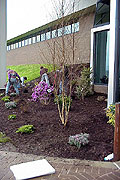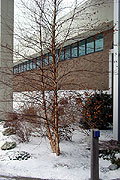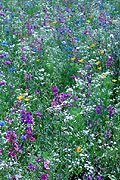| |
REWHC (Raytheon Employees Wildlife Habitat Committee) has engaged nature in a battle to save the trees in our wooded areas. The enemy is an invasive alien, Asian Bittersweet. This vine was imported into New England in the 1860's; first as an ornamental and then planted along railroads and highways to stabilize road banks. Now it is considered a major threat to the native vegetation in most Eastern States and has a strangle grip on many of the trees at Raytheon.
Asian Bittersweet is a rapidly spreading vine on our campus that overtops other species and forms dense strands that shade out native vegetation. Trees and shrubs are strangled by twining stems that twist around trunks and branches constricting the flow of the fluids they need to survive. The trees are girdled and weighed down by masses of vines in the canopies preventing photosynthesis and making them susceptible to damage by wind and snow.
REWHC's efforts to control Bittersweet are focused on the vines growing alongside our trails and choking our largest trees. We are cutting these vines close to the ground and pulling the roots when possible. (Of course cutting the main vine only triggers new growth from any remaining roots - think of Sisyphus rolling that huge rock uphill.) After this initial cutting the vine loses much of its weight and drops its leaves and berries. A second pass through the area cuts the vines off as high as we can reach. This leaves an appearance of snakes dangling from the trees. The last pass is with a tree lopper that can reach twenty-five feet into the canopy. The remaining vines in the treetops will eventually drop -- many broken vines already litter the pathways after each windstorm. The cut vines have been chopped into short lengths to let them lie close to the ground to hasten their rotting and to let native species quickly overgrow and hide this unsightly mess.
We are taking care not to cut or damage the native vines found on the campus. These include Poison Ivy and Fox Grape; both are beneficial to the birds and animals that feed on them. This is important because cutting Bittersweet does reduce the food supply. (Don't worry about the starving birds and bunnies yet, we still have a huge oversupply of the Bittersweet.) When encountered, Bullbrier, a native invasive with nasty thorns, is not accorded this courtesy and is being attacked vigorously along the pathways.
|

Nimitz Butterfly Garden Planting
© 2000, W. Saslow

Nimitz Butterfly Garden In Winter
© 2003, W. Saslow

Wildflowers in Bloom
© 2002, W. Saslow
|